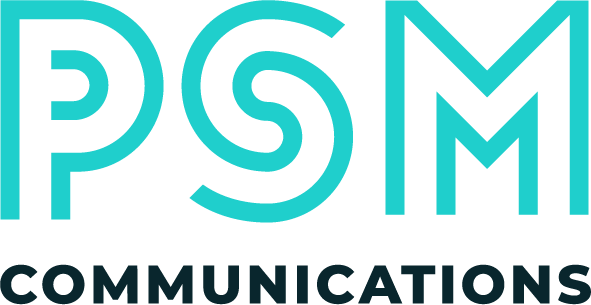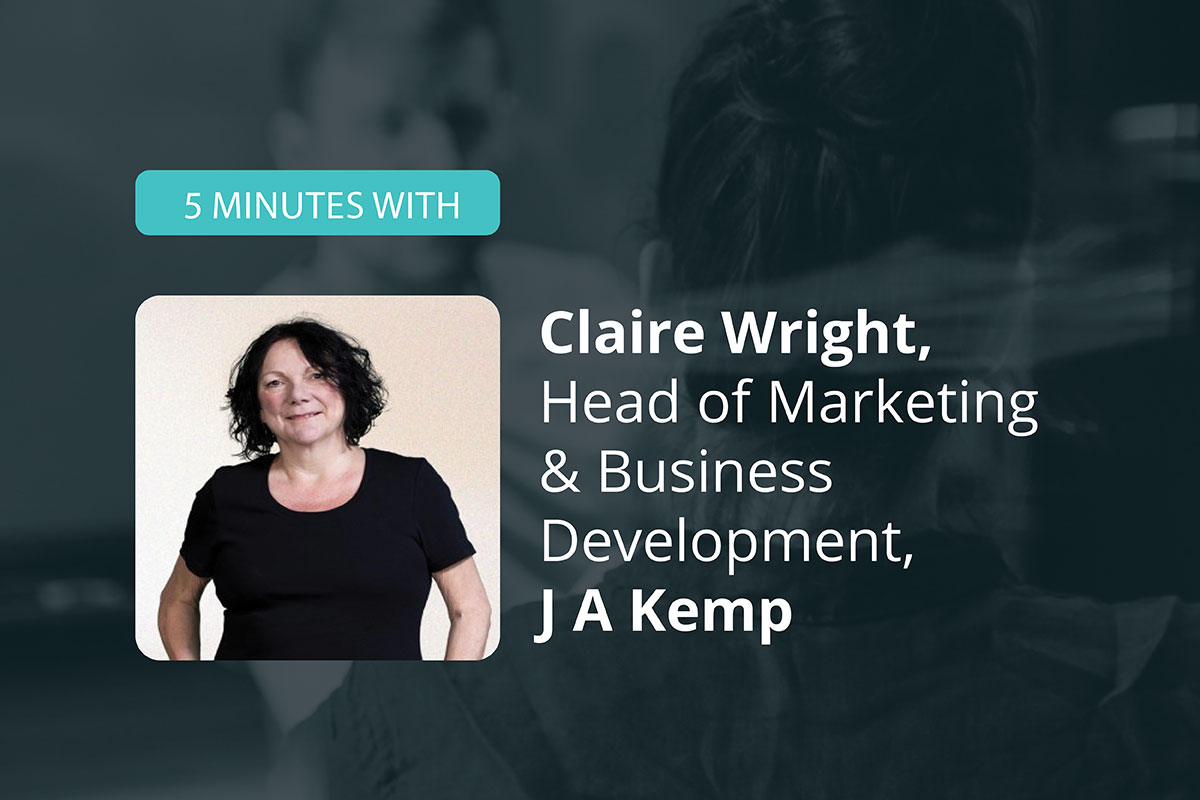This month I’m delighted to be speaking to Claire Wright, Head of Marketing and Business Development at J A Kemp, a UK and European patent, trade mark and design attorneys. Claire has over 20 years experience in professional services marketing, the majority of which has been in the legal sector.
Here’s her 5 minutes with…
Claire, let’s start by you sharing with our readers what your role at J A Kemp involved?
I am responsible for leading the firm’s central marketing operation and guiding, implementing and supporting business development activities throughout the business. I manage a small team, that includes a CRM manager, who drives adoption of InterAction+ and manages data quality.
You’ve just shared J A Kemp’s new brand identity, congratulations! It must have been a wonderful feeling to get it launched – what was the whole project like as I know it was a culmination of two years of research, evaluation, planning and execution?
In late 2022, we identified that the ‘look and feel’ of the J A Kemp brand was not aligned with either the client experience or the impression that we had internally as colleagues.
We embarked on a major piece of client, partner and employee listening, which identified that the brand lacked confidence and that it didn’t reflect the team’s warmth, friendliness and energy, or the strong sense of accountability and shared purpose.
At this point we actually changed agencies. It may seem like a crazy thing to do, but it was always a possibility that the outputs from the research wouldn’t result in a decision to rebrand. It did delay the process, but it also meant costs could be spread over two years. We ended up switching to a smaller agency, but one that still really knew their stuff. It honestly made such a difference. They were easier to work with, and just felt a lot more hands-on. It felt like they properly cared about getting it right for us. The result is a fresher, more confident brand. We’ve got a new logo, colour palette, photography and a more natural tone of voice. One of the biggest changes is the website. It’s much easier to use, easier to update, and gives a far better sense of who we are as a firm.
It’s taken two years of research, planning and graft to get here, but we’re really proud of where we’ve landed.
One of the challenges for professional services marketers is getting the buy-in from senior stakeholders to be bolder and braver, how have you overcome that challenge?
Once we had buy-in to listen to what our clients thought, the outcome was, in my mind, pretty inevitable. We wanted to make sure everyone felt part of the process, so we shared the rebrand options with the whole firm and gave people a chance to have their say – our agency commented that this was pretty unusual for a law firm to do. That openness really helped build momentum and got people feeling like it was something we were all doing together, not just a marketing project.
We had a small steering group helping to guide the project, with two senior partners who really understood what we were trying to do. They totally got it. Having them on board made a huge difference, it gave the whole thing real weight and helped bring others along with us.
The reaction since launch has been really encouraging, we’ve had good feedback from partners. And clients have responded positively too, which reinforces that we’ve landed in the right place.
Now, you’ve worked in professional services/legal marketing for many years, what do you enjoy most about this industry and what have been the biggest changes in marketing that you’ve seen in recent years?
I wasn’t a stranger to service-sector marketing, having worked for a national charity and a local authority, but I hadn’t really appreciated the challenges of working with/for solicitors in a partnership structure. I think I was ‘saved’ by the, newly in-post Senior Partner, who mentored and supported me – even once trying his hardest to find a Sauvignon Blanc that I actually liked at Vivat Bacchus. (Spoiler – he didn’t succeed!). By the time I left, the firm had more than doubled in size and by now it has over 2,500 employees across 20+ locations.
And they are not alone, of course. Over the past decade, the UK legal profession has consolidated through mergers, acquisitions, and regulatory changes. Marketing teams don’t have the same sort of autonomy, visibility or variety of work.
After Beachcroft Wansbroughs/Beachcroft/DAC Beachcroft I struggled to find a new fit until I stumbled across J A Kemp, a firm of patent attorneys. Although still a law firm in the broadest sense, it is quite different to full-service legal firm. At 200 employees and just 40 partners, I have more opportunity to influence, a broader variety of work, and closer collaboration with fee earners.
Fortunately for me, there is currently limited consolidation in the sector. There are only 2,620 registered patent attorneys in the UK and firms can often be conflicted out of working for more than one client in the same technological field.
What do you think is likely to shape the future of professional services/legal marketing?
Future legal marketing will be shaped by client-centric strategies, data-driven decision-making, and AI adoption. By using AI for data analysis, we can better understand our clients in order to personalise their experiences. We can also automate content generation and campaign execution, giving marketing teams the space to become strategists who combine technology, client intelligence, and creativity to drive growth.
Either that or AI will take over a lot of jobs in the profession. I really hope that doesn’t happen.
AI is clearly a much talked about area presently, are you viewing AI positively or negatively in regards to how it can support you in your role?
As the brand project developed, we needed to make some of the content from the existing site more SEO-friendly so I became good pals with ChatGPT. With the right engineering and continued refinement, it can save time and produce a more consistent output. Oh, and it is fantastic for producing minutes from meeting transcripts. But beware of hallucinations. Even the best trained GPT can go rogue!
You’ve obviously rolled out many successful campaigns throughout your career, what has been your favourite and why?
I’m sorry to say that my favourite campaign wasn’t in a professional services firm, it was for Rugby Cement. I was responsible for campaigns across the whole product range to trade and consumer audiences. I led a campaign for a new cement called Rugby Extra Special, which won a Best New Product Launch award from Building Magazine. The highlight of the campaign for me was ‘shelf-wobblers’, but hosting a bunch of editors of the leading trade publications on the cement plant to build walls using the new cement probably came close.
I see you’ve a great calendar of events in place, how important are in-person events to your plan?
Still very important. Our business is built on relationships. A good attorney-client fit is seen as a long-term partnership rather than a transactional engagement.
You hear so much talk about metrics these days, if you could only report on just three marketing KPIs what would they be?
Organic Traffic Growth: one of the most insightful and sustainable marketing KPIs, especially for firms like J A Kemp that rely on expertise, thought leadership, and credibility to attract new business.
Engagement KPIs like email open rates, click-through rates, event/webinar attendance rates.
Marketing Qualified Leads: people who have shown a strong interest in our services. We track this through our own website and our partnerships with Lexology and Mondaq.
When you think back over your career to date, what’s the best piece of marketing advice you’ve ever been given?
You are allowed make two (major) f***-ups a year. I try not to make any, of course, but in the grand scheme of things, and as long as nobody died, I think that’s good advice. If you do, own it, do what you can to put it right, and carry on.
And finally, what one piece of advice would you give to a high-potential marketer today looking to step into their first leadership role?
Evidence indicates that women in professional services marketing roles are less likely to be promoted than men, despite often constituting a majority of junior and mid-level positions. We know that this disparity arises not from ability or ambition, but from a complex mix of factors, but studies also show that men are more likely to apply for a promotion even if they meet only some of the qualifications, while women tend to apply only if they meet all or nearly all of them.
So, my advice is to focus on what you CAN do and not what you can’t; get qualifications that objectively reinforce your capabilities; and utilise coaching and mentoring opportunities to give you the confidence to ‘feel the fear and do it anyway’ (©Dr. Susan Jeffers).

